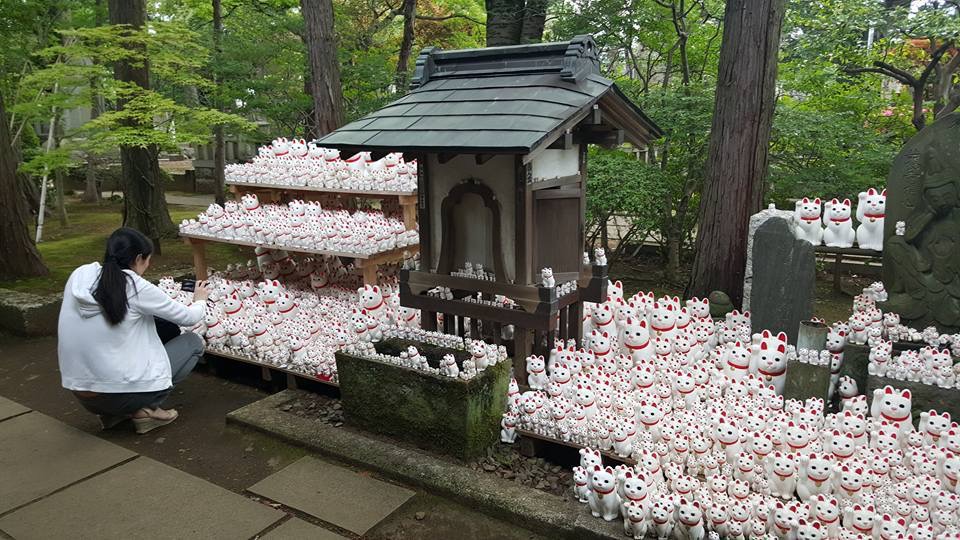The “Lucky Cat” Temple : Gotokuji
Just a few minutes from Tokyo bustling districts such as Shinjuku or Shibuya, is Setagaya Ward. You’ll dive into it to get to Gotokuji, a temple considered at the origin of the well known Maneki-Neko: the cat that welcomes visitors with its right paw up in the air.
Gotokuji Temple is a Buddhist temple that is said to be the birthplace of the maneki-neko, or “luck-inviting cat figurine.” These small statues, which portray a cat sitting up and beckoning with its front paw, have become quite popular all over the world with cat-lovers. Although there are many different kinds of maneki-neko raising either their right or left paws, Gotokuji Temple specializes in the right-pawed version of this good-luck symbol.
Temple legend states that during the early 17th century, Ii Naotaka (then the second lord of the Omi-Hikone Domain) escaped from being caught in a sudden thunderstorm after having been invited inside the temple by a cat that lived there. To show his gratitude to the cat, Naotaka decided to dedicate the temple to the Ii clan. After Naotaka passed away, the temple was renamed to Gotokuji, from his posthumous Buddhist name “Kyushoin-den Gotokuten ei-daikoji.”
The cat that created that opportunity for the temple to grow into a respectable and important place was deified as “Fortune-Inviting Kannon.” The cat was later said to bring good fortune, being called “shou-fuku byou-ji” or “maneki-neko.” Gotokuji Temple has been filled with lucky cat figurines donated by worshippers ever since.
Gotokuji is a quiet temple located outside the noisy center of Tokyo, and is the perfect stop for any cat-lover interested in Japanese culture and history. The staff at Gotokuji Temple are also friendly and welcoming. Even with a language barrier, English speakers will find it easy to learn the story of Fortune-Inviting Kannon and enjoy their time at this marvelous temple.
Inside the temple, visitors can purchase omikuji (Japanese fortunes) and cat figurines in a wide variety of sizes. Omikuji are always fun to get when visiting a temple; for those who cannot read Japanese, the staff can help by telling you if you received a good (大吉) or bad (大凶) fortune. If it’s good, keep it! If not, you can tie the fortune in the branch of the tree near and just outside of the reception area and leave your bad luck behind.
Visitors to Gotokuji will often buy a cat figurine, make a wish or prayer for good luck on it, and then leave it at the temple. However, it is also possible to take the cat figurine home and keep it until the wish or prayer is fulfilled. Afterwards, it is advised to make a return trip to Gotokuji and then place the cat figurine at the temple to give thanks.
The cats themselves are located in a small corner of the temple. Dozens of white cats of all sizes placed together waving in perfect white-pawed unison will make for a great photo of your trip!
Although the cats are the stars of Gotokuji Temple, there are many other things to see. Visitors can purchase wooden ema plaques (from the same building the cat figurines and omikuji are sold) on which they can write their hopes and prayers. The ema boards hung on the wall in hope that the wishes will come true. Of course, the famous maneki-neko of Gotokuji Temple are featured on these boards as well.
At the back of the temple grounds there is a small cemetery containing a small piece of history. Japanese cemeteries are an interesting part of the culture that isn’t commonly discussed, and are difficult to visit as a tourist in Japan because they are often locked. However, at Gotokuji Temple the cemetery is said to hold the remains of the Ii clan, the family that brought the temple its fortune. Even if you can’t read the gravestones, it’s still a nice place to visit.
The grounds of Gotokuji Temple are very beautiful, an excellent example of traditional Japanese architecture paired with the well-tended gardens and a peaceful atmosphere. It is definitely worth a side-trip from the more congested and touristy places of Tokyo to come visit this calm oasis in the middle of the big city, and is the sort of unique experience one can only enjoy in Japan.

